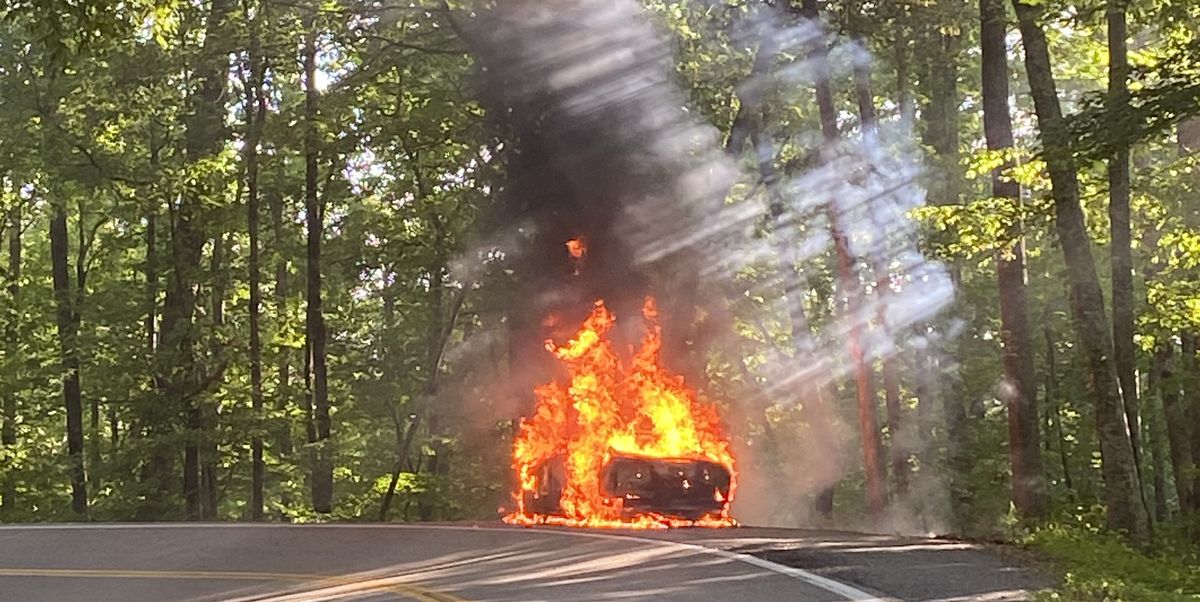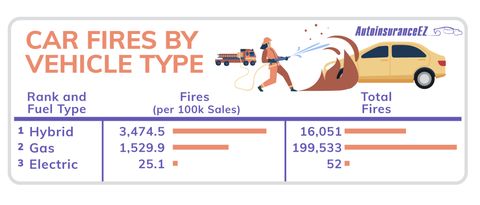No, 5 Percent of Cars Are Not Catching Fire Every Year

Marc UrbanoCar and Driver
Last month, the New York Times ran a story about EV safety and car fires that caught our eye over here at the C/D Department of Fishy Assertions. Titled “Hurdle to Broad Adoption of EVs: The Misperception That They’re Unsafe,” it argues that electric cars catch fire less often than conventional internal-combustion cars or hybrids. It reads, in part:
AutoInsuranceEZ studied the frequency of fires—from all causes, including collisions—in automobiles in 2021. It found that hybrid vehicles, which have an internal combustion engine and an electric motor, had the most fires per 100,000 vehicles (3475), while vehicles with just an internal combustion engine placed second (1530 per 100,000). Fully electric vehicles had the fewest: 25 per 100,000. These findings were based on data from the National Transportation Safety Board and the Bureau of Transportation Statistics.
You don’t have to be a professional statistician to notice that these AutoInsuranceEZ numbers look a wee bit questionable. Because, EVs aside, if 3475 conventional internal-combustion cars are catching fire per 100,000 vehicles, and 1530 hybrids are catching fire per 100,000 vehicles, that’s 5005 fires per 100,000 vehicles. And if we’re not mistaken, that’s more than 5 percent. Imagine that: 5 percent of the cars catching fire last year, one in 20 cars sitting there ablaze at some point. You’d definitely know someone whose car caught fire. Maybe your car caught fire. It might be on fire right now! “Oh, another car fire,” you’d say, driving past the third conflagration of your morning commute.

Maybe they’re comparing all fires with a single year of new-car sales? We’ll let you know if we untangle this.
Car and Driver
To try to figure out where these numbers came from, we first contacted the National Transportation Safety Board, purported source for the car-fire statistics. And the NTSB’s spokesman told us, “There is no NTSB database that tracks highway vehicle fires. We do not know what data AutoInsuranceEZ used for its research, but it did not come from an NTSB database.” They suggested that perhaps the study authors confused the NTSB with NHTSA, the National Highway Traffic Safety Administration. So we contacted NHTSA.
And guess what? NHTSA doesn’t collect fire data in this way, either. NHTSA—which we should call “the NHTSA,” but that sounds weird—collects data on crashes but says that only about 5 percent of fires are crash-related. So they rely on other sources for information, like the National Fire Incident Reporting System (NFIRS). Which, in any case, doesn’t categorize fires according to the type of vehicle powertrain.
At this point you may be asking whether your car is going to catch fire or what, so here’s what we found. According to the National Fire Protection Association, which gets its info from the NFIRS, passenger cars averaged 117,400 fires annually between 2013 and 2017. And the Bureau of Transportation Statistics says that there were 261,037,752 registered vehicles in the US in 2018 (excluding semi-trucks, motorcycles, and buses). So, do a little division, carry the one . . . and that equals .04 percent of vehicles catching fire in a given year. Which means that the NYT-slash-AutoinsuranceEZ numbers are off by a factor of 125. Granted, we’re using numbers from recent years, here, but we’re pretty sure car fires didn’t become 125 times more common in 2021.
We reached out to AutoinsuranceEZ (which appears to be a lead generator for car insurance companies), and we’ll let you know if they ever get back to us, but in the meantime, here’s your good news for the day: Regardless of whether you drive a Rivian, a Prius, or a Cutlass Supreme donk, your car probably won’t ever catch fire. But if you still want to wear Nomex underpants, we’re not gonna stop you.
This content is imported from {embed-name}. You may be able to find the same content in another format, or you may be able to find more information, at their web site.
This content is created and maintained by a third party, and imported onto this page to help users provide their email addresses. You may be able to find more information about this and similar content at piano.io



